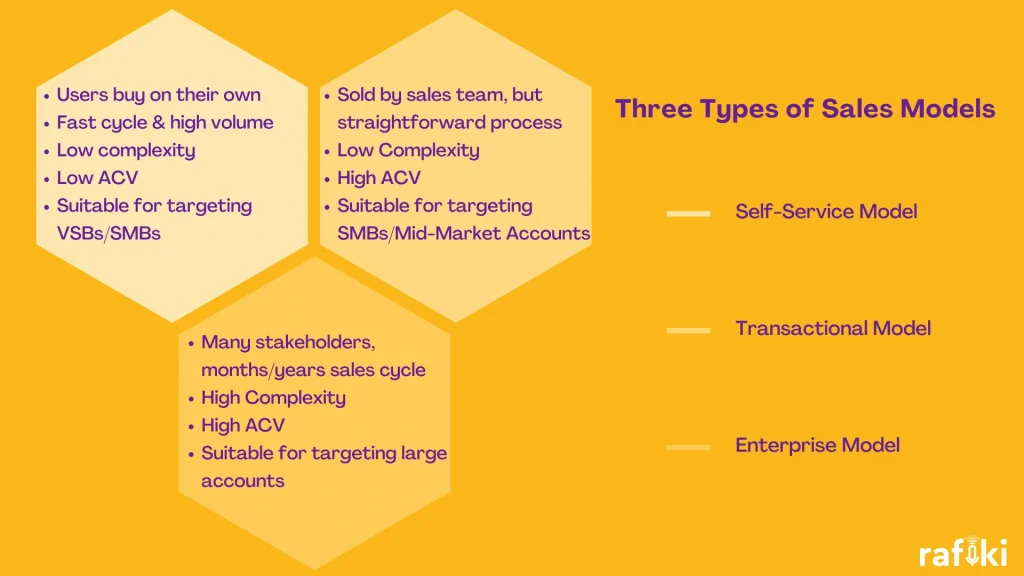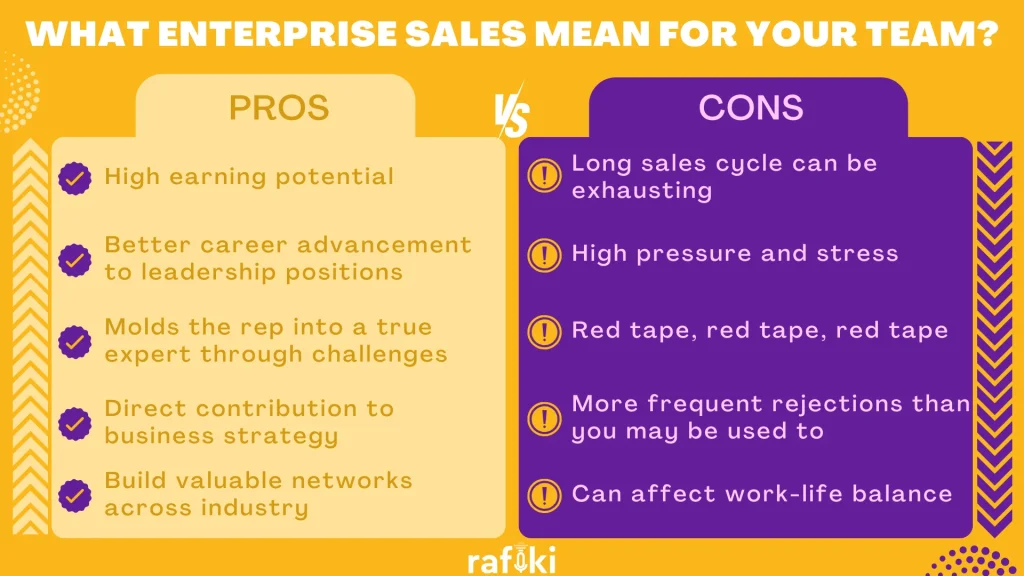What is Enterprise Sales? The Ultimate Guide for Sales Professionals
Enterprise sales can feel like climbing Mount Everest – challenging, demanding, but ultimately incredibly rewarding. Unlike B2B sales to small and medium businesses, enterprise deals involve complex solutions, lengthy sales cycles, and a multitude of stakeholders. All these can make any salesperson feel like they’re on the receiving end of a:

This guide will equip you with the knowledge and strategies to navigate the intricacies of enterprise sales (also known as “complex sales”), helping you close those high-value deals and help you stand on your feet in the vortex of enterprise sales.
The Enterprise Landscape: A World Apart from SMB Sales
Selling to Fortune 500 companies is a different ball game compared to your average SMB deals. While the fundamentals of building rapport and understanding customer needs remain constant, enterprise sales involve a larger playing field with more complex rules. Here’s what sets them apart:

Deal Size and Sales Cycle
Enterprise deals are significantly larger, often reaching millions of dollars. Correspondingly, sales cycles can stretch for months, involving multiple decision-makers with varying priorities and concerns.
Stakeholder Management
Forget cozy one-on-one meetings. Enterprise deals involve a network of stakeholders, from technical specialists to budget approvers and C-suite executives. Identifying champions within the organization and navigating their often-conflicting needs is crucial for success.
Solution vs. Outcome
Enterprise buyers aren’t simply looking for features; they want positive business outcomes and a clear return on investment (ROI). Sharpening your focus on quantifiable outcomes and value proposition will be paramount. Be prepared to showcase the quantifiable impact your solution will have on their key metrics, like increased revenue, reduced costs, or improved efficiency.
Demonstrate Value Proposition
Go beyond generic product descriptions. Clearly articulate the unique value your solution offers, addressing their specific pain points and aligning with their strategic goals.
Speak Their Language
Technical jargon won’t impress these business-minded decision-makers. Tailor your communication to resonate with their priorities and translate features into tangible business benefits.
Understanding these key differences will equip you to adjust your sales strategy and approach the enterprise landscape with confidence.
Imagine this – you’re armed with in-depth insights gleaned from a recent call with a key decision-maker. Wouldn’t it be fantastic to automatically capture these crucial details and talking points for easy reference later? Rafiki’s Smart Call Summary can do just that, automatically summarizing your calls with superior accuracy, freeing you up to focus on building relationships and closing deals.
Collaboration is the Key to Enterprise Sales Success
Enterprise sales is a team sport, not a solo act. The complex nature of these deals necessitates collaboration across various departments to achieve success. Here’s how to foster a winning team environment:
Within Your Sales Team
- Clearly Defined Roles: Ensure everyone involved understands their specific responsibilities and how they contribute to the overall sales cycle.
- Open Communication: Maintain regular communication channels between your entire sales team. Sharing insights and updates keeps everyone on the same page and fosters a sense of collective ownership. You must aim to create a united front that inspires trust and confidence in enterprise buyers.
- Leveraging Expertise: Don’t be afraid to tap into the expertise of your colleagues. Pre-sales engineers or similar product specialists can provide in-depth solution knowledge, while sales enablement materials can offer valuable resources to share with prospects.
Imagine having a central location to ask questions about your team’s performance, specific deals, or account information. Ask Rafiki Anything makes this a reality. This feature functions like a powerful AI assistant, leveraging its knowledge of your sales data to answer your questions and provide insights instantly, empowering you to make data-driven decisions and navigate the complexities of enterprise sales with greater clarity.
Within Your Organization
- Marketing: Marketing can provide valuable sales collateral, buyer personas, and insights into customer needs. Collaborate with marketing to ensure your messaging aligns with their campaigns and resonates with your target audience.
- Product: Involve product specialists early on in the sales cycle. Their deep understanding of your solution can be invaluable during demos and technical discussions, addressing specific customer concerns and showcasing the product’s capabilities effectively.
- Customer Success: The customer success team plays a crucial role in ensuring long-term customer satisfaction and retention. Working together, you can anticipate potential roadblocks, develop onboarding strategies, and showcase the ongoing value your solution delivers.
Rafiki’s Smart CRM Sync can be a game-changer here. By seamlessly syncing data between your CRM and Rafiki, everyone on the team has access to the most up-to-date call details and customer information. This eliminates data silos and ensures all departments are working with the same information, fostering a more collaborative and efficient sales process.
Choosing the Right Sales Methodology for the Enterprise Battlefield
Before learning about how to choose the right sales methodology, let’s first look at a quick reminder on the pros and cons of enterprise sales from a sales professional’s perspective. This will set the context for deciding the right sales methodology that not only fits your ICP, but also your team:

The vast landscape of enterprise sales can be daunting. But there are proven sales methodologies to guide your approach. Here are a few effective frameworks to consider:
- MEDDIC: This methodology emphasizes qualifying leads based on Metrics, Economic Buyer, Decision Process, Decision Authority, Implications, and Champions. MEDDIC ensures you’re targeting the right decision-makers and understand the economic impact of your solution.
- Challenger Sale: This approach encourages salespeople to challenge the status quo and push prospects to think differently about their business problems. By acting as a trusted advisor, you can position yourself as a valuable partner in their journey towards success.
- SNAP Selling: This methodology focuses on keeping things Simple, being Invaluable to the customer, aligning your solution with their Needs and Priorities. By streamlining your communication and demonstrating clear value, SNAP Selling helps you cut through the noise and capture attention in the busy world of enterprise buyers.
Remember, the best methodology is the one that best suits your specific product, target audience, and sales team. Analyzing your sales data and experimenting with different approaches can help you identify the most effective strategy for closing those high-value enterprise deals.
While mastering these methodologies is crucial, sometimes valuable insights can be buried within lengthy call recordings. Rafiki’s Smart Call Scoring can help identify these golden nuggets. By objectively evaluating your call performance and highlighting areas for improvement, Rafiki empowers you to refine your approach and become a master of the enterprise sales game.
Advanced Strategies for Enterprise Success
Mastering the fundamentals is just the first step. Here are some additional strategies to elevate your enterprise sales game:
Champion Building
Identify and cultivate relationships with internal champions within the prospect’s organization. These advocates can influence decision-makers and expedite the sales process.
Stakeholder Management
Develop a comprehensive strategy to manage the various stakeholders involved in the deal. Understand their individual needs and concerns, and tailor your communication accordingly.
Value Negotiation
Be prepared to navigate complex negotiations and effectively communicate the unique value proposition your solution offers.
Technology and Automation
Leverage technology like sales automation tools and conversation intelligence platforms (like Rafiki!) to streamline tasks, gain valuable insights, and improve overall sales efficiency.
Equipping Yourself for Enterprise Sales Success
The world of enterprise sales offers a dynamic and rewarding business journey. By embracing the strategies and leveraging the power of collaboration, you can transform yourself into a master negotiator, closing high-value deals and propelling your business to new heights.
Conquer Enterprise Sales
Explore how Rafiki can help you conquer enterprise sales by signing up for a free 14 day trial today!